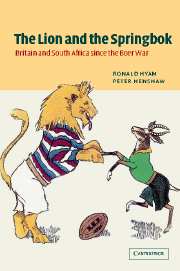Book contents
- Frontmatter
- Contents
- List of illustrations
- List of tables
- Preface
- Acknowledgements
- List of abbreviations
- 1 The uneasy special relationship: dynamics and divergencies
- 2 Breakdown: into war, 1895–1899
- 3 Post-war: the myth of magnanimity, 1905–1907
- 4 African interests and the South Africa Act, 1908–1910
- 5 ‘Greater South Africa’: the struggle for the High Commission Territories, 1910–1961
- 6 The economic dimension: South Africa and the sterling area, 1931–1961
- 7 Britain, the United Nations, and the ‘South African disputes’, 1946–1961
- 8 The political consequences of Seretse Khama and Ruth, 1948–1952
- 9 Containing Afrikanerdom: the geopolitical origins of the Central African Federation, 1948–1953
- 10 Strategy and the transfer of Simon's Town, 1948–1957
- 11 The parting of the ways: the departure of South Africa from the Commonwealth, 1951–1961
- 12 Enfeebled lion? How South Africans viewed Britain, 1945–1961
- 13 Springbok reviled: some British reactions to apartheid, 1948–1994
- Epilogue The relationship restored: the return of the new South Africa to the Commonwealth, 1994
- Select bibliography
- Index
2 - Breakdown: into war, 1895–1899
Published online by Cambridge University Press: 03 December 2009
- Frontmatter
- Contents
- List of illustrations
- List of tables
- Preface
- Acknowledgements
- List of abbreviations
- 1 The uneasy special relationship: dynamics and divergencies
- 2 Breakdown: into war, 1895–1899
- 3 Post-war: the myth of magnanimity, 1905–1907
- 4 African interests and the South Africa Act, 1908–1910
- 5 ‘Greater South Africa’: the struggle for the High Commission Territories, 1910–1961
- 6 The economic dimension: South Africa and the sterling area, 1931–1961
- 7 Britain, the United Nations, and the ‘South African disputes’, 1946–1961
- 8 The political consequences of Seretse Khama and Ruth, 1948–1952
- 9 Containing Afrikanerdom: the geopolitical origins of the Central African Federation, 1948–1953
- 10 Strategy and the transfer of Simon's Town, 1948–1957
- 11 The parting of the ways: the departure of South Africa from the Commonwealth, 1951–1961
- 12 Enfeebled lion? How South Africans viewed Britain, 1945–1961
- 13 Springbok reviled: some British reactions to apartheid, 1948–1994
- Epilogue The relationship restored: the return of the new South Africa to the Commonwealth, 1994
- Select bibliography
- Index
Summary
After the passage of a century and the appearance of countless publications on the South African War, there remain the most profound differences of opinion about the war's origins. Many of the more recent accounts have emphasised Britain's economic interests in the southern African periphery – principally in the production and supply of gold – and the consequent necessity of removing the administratively backward and economically obstructionist regime of Paul Kruger in Pretoria. Other accounts have stressed the concerns of British government decision-makers at the imperial centre – concerns about British power and prestige, about the necessity of maintaining British paramountcy in southern Africa, and about safeguarding the strategically vital Cape route. Further divisions exist between those accounts which stress the broader structural forces at play and those which give a central role to key individuals such as Sir Alfred Milner (Britain's high commissioner and regional proconsul for southern Africa) or Joseph Chamberlain (the colonial secretary in London). This chapter will attempt to explain the War's origins through an analysis combining the broader economically driven developments in southern Africa; the geopolitical concerns of decision-makers in London; and the influence of Milner as the key ‘man on the spot’ and intermediary between the periphery and the centre.
This explanation will be based on a model of imperial expansion first proposed by Ronald Hyam.
- Type
- Chapter
- Information
- The Lion and the SpringbokBritain and South Africa since the Boer War, pp. 37 - 56Publisher: Cambridge University PressPrint publication year: 2003



